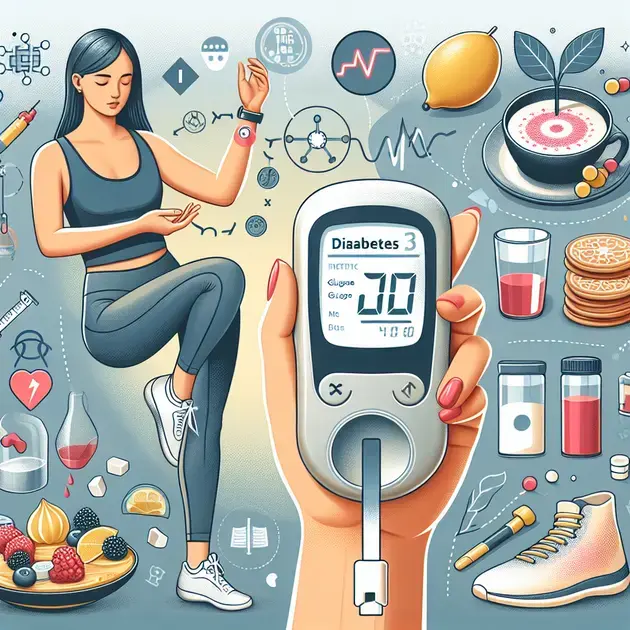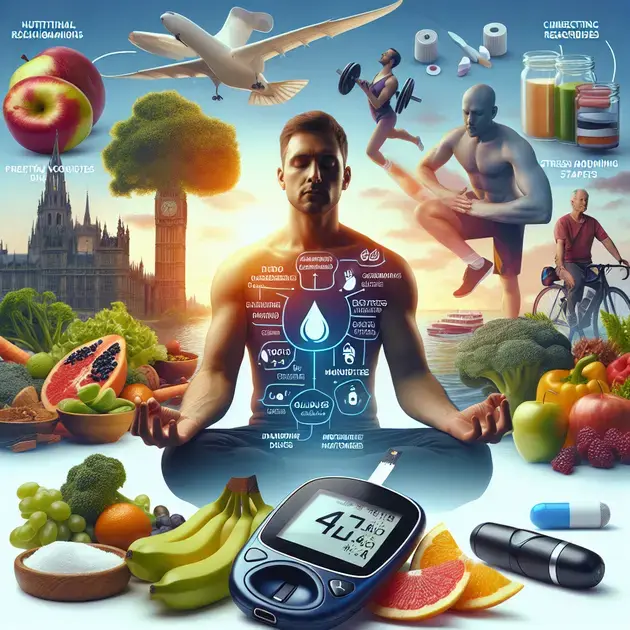Managing diabetic blood sugar levels is crucial for individuals with diabetes to maintain overall health and well-being. In this comprehensive guide, we will cover various strategies and techniques to help you effectively manage your blood sugar levels on a daily basis.
With the latest advancements in technology, there are now innovative tools and resources available to assist individuals in monitoring and controlling their blood sugar levels more efficiently. This guide will provide you with the information you need to navigate these resources and take control of your health.
Effectively Monitoring Your Blood Sugar Levels
Effectively monitoring your blood sugar levels is crucial for managing diabetes and ensuring your overall health. One of the best ways to do this is by using a reliable blood glucose monitor, such as the Accu-Chek Guide Me. This user-friendly device allows you to easily check your blood sugar levels at home.
Another important aspect of monitoring your blood sugar levels is keeping a detailed log of your readings. You can use apps like mySugr or Glucose Buddy to track your blood glucose levels, food intake, and physical activity. These apps provide valuable insights into how your lifestyle choices affect your blood sugar levels.
In addition to using a blood glucose monitor and tracking your readings, it’s essential to stay informed about managing diabetes. Websites like the American Diabetes Association offer a wealth of information on blood sugar monitoring, healthy eating, and exercise tips for individuals with diabetes.
Regularly monitoring your blood sugar levels can help you and your healthcare provider make informed decisions about your diabetes management plan. By adopting these monitoring practices and utilizing the right tools, you can take control of your health and well-being.
Incorporating Technology for Better Blood Sugar Management
Technology plays a vital role in improving blood sugar management for individuals with diabetes. One useful tool is the continuous glucose monitoring (CGM) system, such as Dexcom G6. This device automatically tracks your blood sugar levels throughout the day, providing real-time data and alerts for high or low readings.
Another way to incorporate technology for better blood sugar management is by using insulin pumps like the Tandem t:slim X2. These devices deliver insulin in precise doses based on your blood sugar levels, making it easier to maintain stable glucose levels.
To enhance your blood sugar management further, consider utilizing telemedicine services like Doctor on Demand or Teladoc. These platforms allow you to consult with healthcare providers remotely, making it convenient to discuss your blood sugar management and receive expert advice.
By embracing technology and integrating innovative devices and services into your diabetes care routine, you can achieve greater control over your blood sugar levels and lead a healthier life.
Empowering Yourself to Take Control of Your Health
Empowering yourself to take control of your health is essential for managing diabetes effectively. Start by educating yourself about diabetes management strategies through reputable sources like the Centers for Disease Control and Prevention (CDC) website.
Engaging in regular physical activity is another empowering step you can take to improve your health. Utilize fitness apps like MyFitnessPal or Nike Training Club to track your workouts, set fitness goals, and stay motivated on your journey to better health.
Building a strong support network is also crucial for empowering yourself in your health journey. Join online diabetes communities on platforms such as TuDiabetes or Beyond Type 1 to connect with others facing similar challenges and share experiences.
Remember to prioritize self-care and mental well-being as part of your health empowerment journey. Meditation apps like Headspace or Calm can help reduce stress and improve your overall quality of life, which can positively impact your blood sugar management.
By taking proactive steps to empower yourself, you can gain confidence in managing your health and diabetes, leading to better outcomes and a higher quality of life.
Key Strategies for Improving Your Diabetic Blood Sugar Levels
Managing your blood sugar levels effectively is crucial for diabetic individuals to maintain good health. By implementing key strategies, you can improve your diabetic blood sugar levels and enhance your overall well-being. One essential strategy is to monitor your blood sugar regularly. This involves checking your levels multiple times a day to ensure they are within the target range. By keeping track of your blood sugar readings, you can make informed decisions about your diet, medication, and lifestyle habits.
Another important strategy is to follow a balanced and nutritious diet. Consuming foods that are low in sugar and high in fiber can help regulate your blood sugar levels. Focus on incorporating plenty of fruits, vegetables, whole grains, and lean proteins into your meals. Avoid processed and sugary foods, as they can cause spikes in blood sugar.
Engaging in regular physical activity is also key to improving diabetic blood sugar levels. Exercise helps your body use insulin more efficiently, which can lower your blood sugar levels. Aim for at least 150 minutes of moderate-intensity exercise per week, such as brisk walking, cycling, or swimming. Remember to consult with your healthcare provider before starting any new exercise routine.
Additionally, managing stress levels and getting an adequate amount of sleep are important strategies for controlling blood sugar. High levels of stress can lead to increased blood sugar levels, so finding ways to relax and unwind, such as meditation or deep breathing exercises, can be beneficial. Prioritize getting 7-9 hours of quality sleep each night to support overall health and blood sugar regulation.
By incorporating these key strategies into your daily routine, you can effectively improve your diabetic blood sugar levels and reduce the risk of complications associated with diabetes. Remember to work closely with your healthcare team to develop a personalized plan that meets your specific needs and goals.
Nutritional Tips for Managing Your Blood Sugar Effectively
When it comes to managing your blood sugar effectively, making smart food choices plays a critical role. Including a variety of nutrient-rich foods in your diet can help regulate your blood sugar levels and promote overall health. Start by focusing on portion control and meal timing. Eating smaller, more frequent meals throughout the day can prevent blood sugar spikes and crashes.
Choose carbohydrates that are high in fiber and low in added sugars. Whole grains, legumes, fruits, and vegetables are excellent sources of complex carbohydrates that can help stabilize blood sugar levels. Incorporating healthy fats, such as avocados, nuts, and olive oil, into your meals can also aid in blood sugar control.
Protein is another important macronutrient for managing blood sugar. Including lean sources of protein, such as poultry, fish, tofu, and legumes, can help you feel full and satisfied while preventing spikes in blood sugar. Be mindful of your alcohol consumption, as it can affect blood sugar levels. Opt for light beer or dry wines in moderation, and always accompany alcoholic beverages with food.
Stay hydrated by drinking plenty of water throughout the day. Dehydration can lead to blood sugar fluctuations, so it’s important to prioritize fluid intake. Keep track of your food choices and blood sugar readings to identify patterns and make adjustments as needed. Consulting with a registered dietitian can provide additional guidance on managing your blood sugar through nutrition.
By following these nutritional tips and incorporating them into your daily routine, you can effectively manage your blood sugar levels and support your overall health and well-being. Remember that small changes can make a big difference in controlling diabetes and reducing the risk of complications.
Physical Activity’s Role in Controlling Diabetic Blood Sugar Levels
Regular physical activity is a powerful tool for controlling diabetic blood sugar levels and improving overall health. Exercise helps your body use insulin more efficiently, which can lower blood sugar levels and reduce the risk of complications associated with diabetes. Developing a consistent workout routine is essential for managing diabetes effectively.
Start by incorporating aerobic exercise into your weekly schedule. Activities such as walking, jogging, cycling, or swimming can help increase your heart rate and improve blood sugar control. Aim for at least 150 minutes of moderate-intensity aerobic exercise per week, divided into manageable sessions. Gradually increase the duration and intensity of your workouts as your fitness level improves.
In addition to aerobic exercise, strength training is beneficial for diabetic individuals. Building muscle mass can enhance your body’s ability to utilize glucose and improve insulin sensitivity. Include resistance exercises, such as weightlifting or bodyweight workouts, in your routine 2-3 times per week. Focus on all major muscle groups to promote overall strength and balance.
Flexibility and balance exercises are also important for diabetic individuals, as they can help reduce the risk of injuries and improve overall mobility. Practicing yoga, Pilates, or tai chi can enhance flexibility, coordination, and mental well-being. Incorporate stretching exercises into your routine to maintain joint health and mobility.
Remember to monitor your blood sugar levels before and after exercise to identify how your body responds to physical activity. Carry fast-acting carbohydrates with you during workouts in case of hypoglycemia. Stay hydrated and listen to your body’s signals to prevent overexertion. By making physical activity a priority in your diabetes management plan, you can improve blood sugar control and enhance your quality of life.
Conclusion
In conclusion, effectively managing diabetic blood sugar levels is essential for maintaining overall health and well-being. By implementing key strategies such as monitoring blood sugar regularly, following a balanced and nutritious diet, engaging in regular physical activity, managing stress levels, and prioritizing adequate sleep, individuals with diabetes can significantly improve their blood sugar control and reduce the risk of complications associated with the condition.
When it comes to nutrition, making smart food choices, focusing on portion control, and selecting carbohydrates high in fiber and low in added sugars are crucial steps in regulating blood sugar levels. Incorporating healthy fats and lean sources of protein, while being mindful of alcohol consumption and staying hydrated, can further support blood sugar management. Consulting with a registered dietitian can offer additional guidance in navigating dietary choices for optimal blood sugar control.
Physical activity also plays a pivotal role in controlling diabetic blood sugar levels. Incorporating aerobic exercises, strength training, flexibility, and balance exercises into a consistent workout routine can help improve insulin sensitivity, enhance glucose utilization, and reduce the risk of complications related to diabetes. Monitoring blood sugar levels before and after exercise, carrying fast-acting carbohydrates, and staying hydrated are essential precautions to ensure safe and effective physical activity.



















